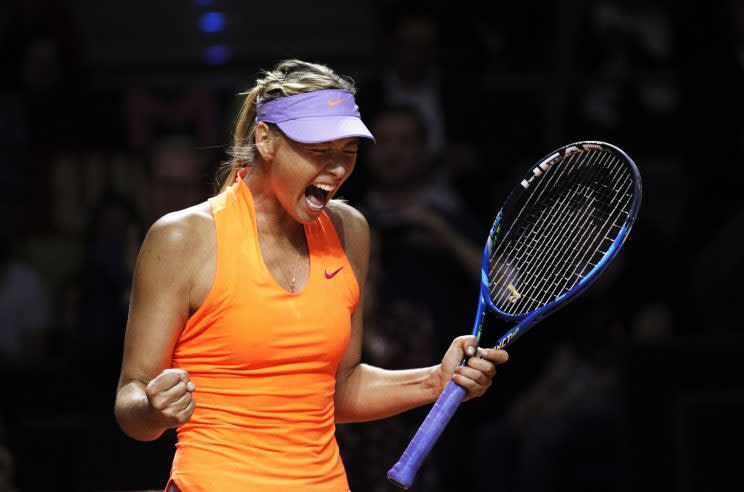How Maria Sharapova can repair her tainted reputation

Maria Sharapova made her return to tennis after a 15-month drug suspension this week at the Porsche Tennis Grand Prix in Stuttgart, Germany, where the former world no. 1, now unranked, was given a wildcard entry into a tournament that a) is sponsored by one of her sponsors b) actually started before her ban was lifted and c) conveniently scheduled her first match just hours after she became eligible again.
Not surprisingly, this didn’t sit well with some of her peers, who already carry a not-so-high opinion of Sharapova who, during the the 2016 Australian Open, tested positive for meldonium, a drug — commonly used by athletes in Russia — that had landed on the WTA’s banned substances list weeks before. Sharapova said she had been taking it as prescribed by a family doctor for a decade to combat a variety of illnesses while on tour, but did not realize the substance had been banned.
Penance served, she’s now back, though not everyone is thrilled.
“I think it’s disrespectful to other players and the WTA, allowing a player that is still banned to play a tournament that week,” Caroline Wozniacki said last month back in Indian Wells. “Obviously the rules are twisted and turned in favor of who wants to do what.”
“I don’t think that’s right,” Eugenie Bouchard said Wednesday. “She’s a cheater and so to me, I don’t think a cheater in any sport should be allowed to play that sport again.”
“I don’t have a problem with a tournament giving a wild card to anyone it wants,” said Sam Stosur, whose career record against Sharapova is 2-15. “I have a problem with one being given to a player who’s banned for the first day of the tournament.”
That won’t be the case in Madrid or Rome, where upcoming tournaments are also giving Sharapova wildcard entries. The French Open, which the five-time Grand Slam champion has won twice, will decide Sharapova’s fate on May 16.
Jo-Wilfried Tsonga, the country’s highest-ranked tennis player, said giving Sharapova a wildcard at Roland Garros would “be like giving a candy to a child who has misbehaved.”
If Sharapova is granted a wildcard in Paris, she should say, “Thanks, but no thanks. I’ll play my way in through the qualifying.”
Based on her first-set struggle in Stuttgart against Roberta Vinci, a player who had taken just four games off her before Wednesday, Sharapova could use some match play. If it were up to me, I’d have her play her way into the warm-ups, too.
This would garner her some great PR — something Sharapova and her handlers constantly monitor — and, perhaps, respect in the locker room.

“There’s no secret that she was one of the most unpopular players in the locker room so a lot of players have their opinions about her,” Boris Becker told London’s Telegraph newspaper earlier this month.
“She’s a totally unlikable person,” Dominika Cibulkova said last year. “Arrogant, conceited and cold. When I sit beside her in the locker room, she won’t even say hello.”
“I didn’t speak with her before; there’s no reason to speak now,” Simona Halep said when Sharapova announced her suspension last March.
“The question is on her and how does she treat the comeback. Will she behave the way she behaved before? That would not be so good,” Becker said. “Will she be a bit more charming and a bit more friendly to everybody? I hope so. People make mistakes, it’s the nature of things. I just hope she becomes a little more friendly towards the other players.”
There was a tiny glimmer of unexpected friendliness on Wednesday when she was asked about Serena Williams’ pregnancy, which the world no. 1 revealed on the same day of Sharapova’s 30th birthday.
“It’s one of the greatest gifts that a woman can receive in her life and it’s really a blessing,” Sharapova said. “It’s a beautiful chapter in her life.”
Has time away from the tour — which included a three-day “internship” with NBA commissioner Adam Silver at the league’s headquarters in New York City; a course at Harvard Business School; and a fitness regimen filled with spinning and boxing — softened Sharapova’s notoriously icy edge?
Possibly? Hopefully?
“This past year, my intake of alcohol was so much more than ever in my life,” Sharapova told Vogue in March. “But it was because I actually had a social life!”
Then again, don’t expect Sharapova to suddenly be the bearer of locker room banter.
“Words and quotes and articles is not what matters in life, and I learned that very well in the past year,” she said after her first match back. “At the end of the day, all that matters is what’s on the court, and that’s why I’m here.”

 Yahoo Sports
Yahoo Sports 

